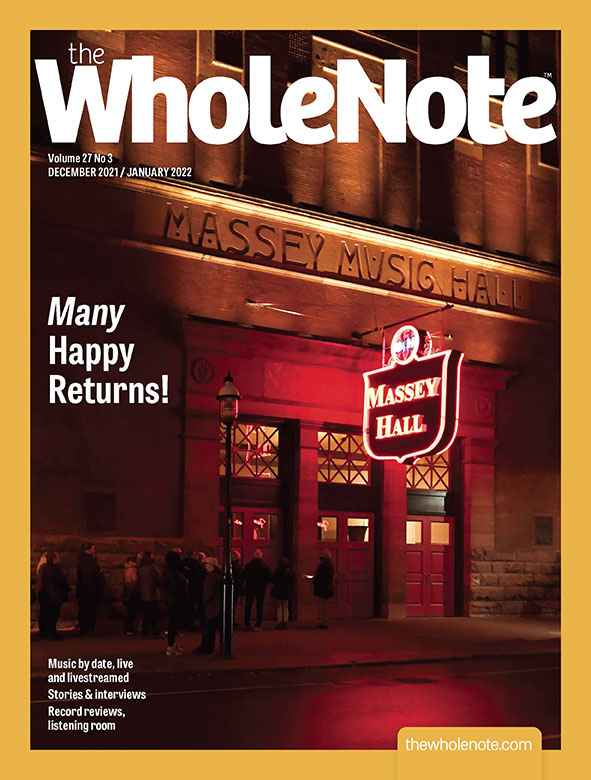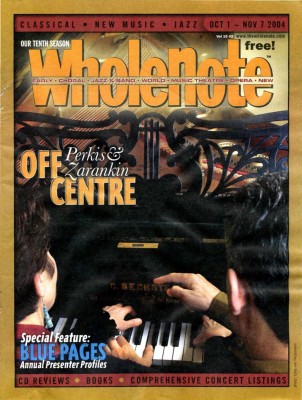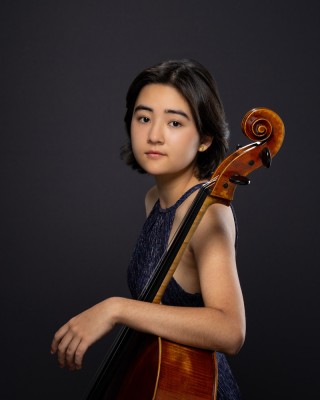Truth be told, I can never quite tell from my notes after interviewing them, which of them said what. It’s a bit like watching a couple of people playing a cooperative racquet game, batting half-sentences back and forth, with the objective of keeping the narrative alive rather than scoring points. Not so different, come to think of it, from the piano four hands artistry that has been at the core of Off Centre Salon’s identity from the get-go.
Here’s an example of the batting back-and-forth, from the very beginning of our previous conversation in October 2004.
WholeNote: Why Off Centre?
Boris: Well, we started in Markham, so you could say that was definitely off centre …
Inna: Definitely!
Boris: …but of course also in the sense of not usual, so therefore room to experiment.
Inna: Exactly. The moment we become “in the square” and proper, we will have failed.
Boris: So ten years ago we were in Markham; the first three salons were there.
Inna: It was the hall of a music store
Boris: Euromusic. After that, the audience was already too big and we moved to the Arts and Letters Club for three, or was it four …?
Inna: It was three
Boris: seasons.
Inna: And then to the Glenn Gould.
Boris: Which is where we are still.
Inna: For the next twenty years.
(They both laugh.)
Twenty years later, they are no longer at the CBC’s Glenn Gould Studio. Trinity-St. Paul’s Centre on Bloor St. has become their new haven.
So, are you still getting ideas from that notebook? I ask. Indeed they are. And they rhyme them off for me. “October 19, Poulenc’s Le bal masqué ; December 14, Rimsky Korsakov’s chamber opera Mozart and Salieri; March 14, Debussy’s Afternoon of the Faun (Ravel’s four-hand arrangement). A full-length feature film …and, what else? Ah yes, mentoring.’’
But it’s not like crossing off items on a bucket list, they tell me. “Every notebook idea is just an embryo which has to grow into something bigger and complex, and this is a process. We look at each concert as an equation with many unknowns, becoming a puzzle where everything is tight and fits together perfectly.”
As to what constitutes a “perfect fit” at an Off Centre salon, one thing is certain. It is always more than just how the music fits together. It’s about evoking how that musical program might unfold in the context of the salon – a room where the boundaries between performer and audience are fluid, and music is just one medium in the swirl of ideas evoked by the occasion. And, of course, there is always a piano at the heart of the room, whether it be a Viennese Bösendorfer or the Yamaha in the recital hall at Euromusic.
It is a vision that has been with them since the transitional year they spent in Vienna, after emigrating from Russia in 1978. “The mix of people all bringing their background disciplines, medicine or philosophy or art or whatever to it. Right from [the beginning] the inspiration was there: how can we, someday, bring this energy back to the concert form.”
Emerging from the maelstrom: One example of this energetic blend of song, reading, commentary and virtuosic musicianship has stuck with me, even after 20 years. It was a concert in January 2004, based on the connection between composers and their doctors: Mozart and Mesmer, Brahms and Billroth, Rachmaninoff and Dr. Dahl. As Perkis and Zarankin explained at the time,“It so happens that Brahms’ Piano Trio Opus 101 was dedicated to and first performed in the salon of one Dr. Billroth, a talented musician and friend of the composer’s. We went from there.”
How they “went from there” is of course where the hard work and the magic come into it. David Goldbloom, a professor of psychiatry at U of T, and a talented pianist, was one of several speakers that night. (He was also, by then, the chair of the Off Centre Board, and a firm believer). “There’s something very invigorating in seeing how each Salon in its final form emerges from the maelstrom…It is an immensely stimulating association,” he said.
You can see the same “off centre” thinking happening this season if you look at how the first couple of works they mentioned earlier fit the programs they are part of. Poulenc’s Le bal masqué is part of a program titled “From Melancholy to Surrealism, with Laughter in Between” that traces a path from the world of Schubert via Poulenc to Ravel. “Life + Death, Genius + Jealousy” is the context for Rimsky-Korsakov’s Mozart and Salieri, with an emphatic side order: Mussorgsky’s Songs and Dances of Death.
What they make of each of these programs as they find their way into a perfected fixed form remains to be seen. It can only truly come to life in the mix of people, audience and performers alike, gathered around their piano.
Which brings me to the film that sits at the centre of this season. It’s a full-length documentary titled Chopin’s Preludes: A Life in Fragments, and I had the opportunity to view a cut of it (the latest but certainly not the last), courtesy the filmmaker Marcel Canzona. The idea of it is as twisty and well-wrought as a trademark Off Centre salon. In Zarankin’s words it’s about “the ways that Chopin’s Preludes intersect with our lives … an exciting hybrid film that blends live performance with our own immigrant story.”
The photos we chose, for our cover and for the story itself, are both stills from that film.
One topic remains to touch on,
the last item in their “from the notebook” list rhymed off earlier – namely mentoring. They’ve been doing it for years, informally, in the array of young performers and collaborators they have drawn into the orbit of their piano. You have only to look at the already-confirmed cast for the unabashedly celebratory 30th Anniversary Gala that concludes the of the season in June to get a sense of how widely they have cast their net.
But this year, something is different. Look for the name Mira Kardan in the lineup for each of the concerts in the season. Kardan, a cellist in the Glenn Gould School of Music at the Royal Conservatory, is Off Centre’s Artist-in-Residence for the year. It’s yet another big idea in embryo – to turn this one-off residency into a formal ongoing partnership with the Glenn Gould School and Taylor Academy.
After all, if there’s to be another Off Centre notebook with 20 years' worth of ideas in it, it will be because the torch, and the notebook, have been passed, at some point, to another generation.
David Perlman can be reached at publisher@thewholenote.com




